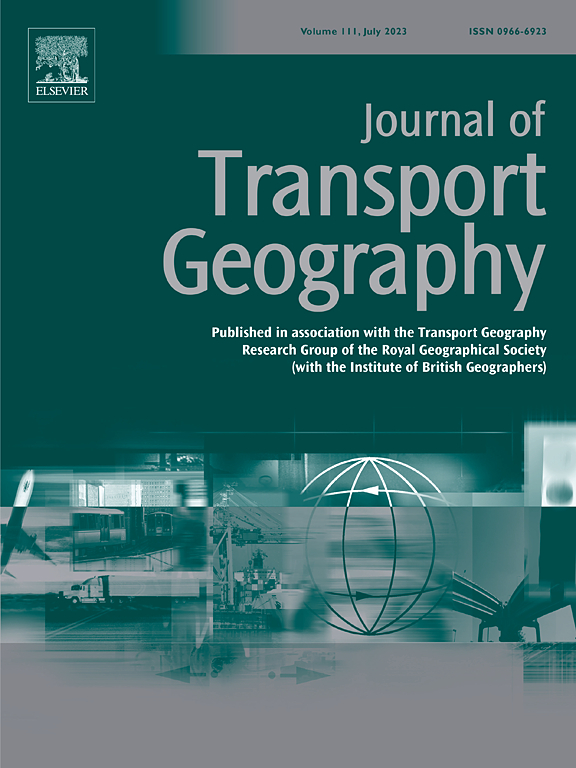共享电动车比共享单车更能适应极端温度:来自纽约市Citi Bike的证据
IF 6.3
2区 工程技术
Q1 ECONOMICS
引用次数: 0
摘要
作为一种主动出行方式,共享单车的使用受到了气候变化的挑战,尤其是极端气温的频率和强度不断增加。尽管研究表明,共享电动自行车有可能减少骑车的障碍,但据我们所知,还没有研究对共享自行车和共享电动自行车的温度恢复能力进行比较。为了解决这一差距,我们比较评估了温度对共享自行车和共享电动自行车使用的影响。基于双向固定效应面板回归模型,利用2023年纽约市花旗自行车系统的3620万次出行记录估算,我们的研究结果表明,在高温(30-32°C)和低温(- 2-0°C)下,共享电动自行车的温度导致的使用损失分别比共享自行车小5.6和7.7个百分点,这反映了前者比后者对极端温度的气候适应能力更高。然而,当温度低于- 2℃时,共享电动自行车的弹性优势减弱。此外,共享电动自行车和共享单车的温度效应表现出时空异质性,短时、短距离和工作日出行在冷热环境下均表现出较高的温度弹性。在高温下,家庭收入中位数较低的地区表现出更高的温度适应能力。这项研究的发现对规划和投资共享电动自行车具有重要的实际意义,可以增强主动出行的温度适应性,特别是在易热城市和低收入社区。本文章由计算机程序翻译,如有差异,请以英文原文为准。
Shared E-bikes are more resilient than shared bikes to extreme temperatures: Evidence from Citi Bike in New York City
As a form of active travel, shared bike use has been challenged by climate change, particularly by the increasing frequency and intensity of extreme temperatures. Although studies indicate that shared e-bikes have the potential to reduce the barriers to cycling, to the best of our knowledge, no studies have compared the temperature resilience of shared bikes and shared e-bikes. To address this gap, we comparatively assess the effects of temperature on shared bike and shared e-bike usage. Based on two-way fixed effects panel regression models estimated using 36.2 million trip records from New York City's Citi Bike system in 2023, our results show that the temperature-induced usage losses are 5.6 and 7.7 percentage points smaller for shared e-bikes than shared bikes during hot (30–32 °C) and cold (−2–0 °C) temperatures, respectively, reflecting a higher climate resilience for the former than the latter to temperature extremes. However, when temperatures are lower than −2 °C, the resilience advantages of shared e-bikes are weakened. Furthermore, the temperature effects on shared e-bikes and shared bikes exhibit spatial and temporal heterogeneities, with short-duration, short-distance, and weekday trips presenting higher temperature resilience at both hot and cold temperatures. Under hot temperatures, areas with lower median household income showcase higher temperature resilience. The findings drawn from this study hold critical practical implications for planning and investing in shared e-bikes to enhance the temperature resilience of active travel, particularly in heat-vulnerable cities and low-income communities.
求助全文
通过发布文献求助,成功后即可免费获取论文全文。
去求助
来源期刊

Journal of Transport Geography
Multiple-
CiteScore
11.50
自引率
11.50%
发文量
197
期刊介绍:
A major resurgence has occurred in transport geography in the wake of political and policy changes, huge transport infrastructure projects and responses to urban traffic congestion. The Journal of Transport Geography provides a central focus for developments in this rapidly expanding sub-discipline.
 求助内容:
求助内容: 应助结果提醒方式:
应助结果提醒方式:


